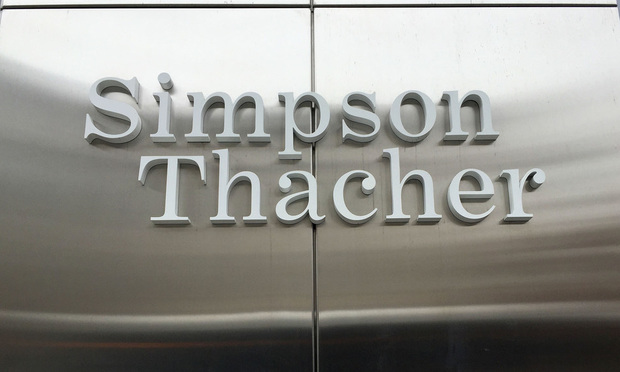Ex-Simpson Thacher Clerk Gets 37 Months in Insider Trading Resentencing
Steven Metro was charged with stealing stock tips from Simpson Thacher and scribbling them on small pieces of paper that his accomplice chewed up to destroy the evidence.
May 09, 2018 at 06:06 PM
4 minute read

Steven Metro, a former managing clerk at Simpson Thacher & Bartlett, was sentenced Wednesday to 37 months in prison for his role in an insider trading scheme based on information he stole from the firm.
The decision came three months after an appeals court vacated a stiffer prison term.
U.S. District Judge Michael A. Shipp of the District of New Jersey had originally ordered Metro, 44, to spend 46 months in prison, but the U.S. Court of Appeals for the Third Circuit in February said that sentence improperly punished him for the actions of his co-conspirators.
Metro reappeared in front of Shipp on Wednesday, receiving the shorter prison term along with three years of supervised release, according to U.S. Attorney Craig Carpenito.

Authorities had initially said that the scheme netted Metro and two others a total of $5.6 million, but on Wednesday they said that Metro's new sentence was based on $2 million in illicit gains directly attributable to him.
Metro was charged in March 2014 and pleaded guilty in November 2015 to giving out stock tips about pending M&A deals to a friend, often by scribbling information on a napkin.
Authorities said that from 2009 to 2014, Metro accessed information from Simpson Thacher's computers to identify clients that were about to participate in a merger or acquisition, sometimes searching using terms such as “merger agreement.”
He then gave that information to his friend Frank Tamayo, who relayed it to his stockbroker, Vladimir Eydelman, generally at meetings in New York's Grand Central Station. Tamayo would hand Eydelman a napkin or Post-it marked with the stock symbol, when to buy and what price to pay. Eydelman would then commit the information to memory and Tamayo would chew up and swallow the note to destroy the evidence, federal prosecutors said.
Metro claimed that he was not aware that Eydelman was involved until one year after he relayed his last tip to Tamayo, who in mid-2015 cut a deal with the U.S. Securities and Exchange Commission.
This purported ignorance was at the heart of the appeal that he lodged with the Third Circuit. Metro argued that he was wrongly sentenced based on the entire $5.6 million in profits generated by the scheme, saying that he should not be held responsible for improper trades of which he was not aware.
The panel agreed, concluding that federal prosecutors failed to demonstrate that Metro acted in concert with or provided inside information to Eydelman.
The appeals court added that the case differed from the 2013 United States v. Kluger insider trading case, which involved Matthew Kluger, a former associate at Cravath, Swaine & Moore; Fried, Frank, Harris, Shriver & Jacobson; Skadden, Arps, Slate, Meagher & Flom; and Wilson Sonsini Goodrich & Rosati. In that case, Kluger admitted that he was providing inside information to a middleman with the intent that it would ultimately go to a stockbroker.
According to court documents, Metro himself earned approximately $168,000 from the scheme, based on Tamayo reinvesting a $7,000 profit from the initial illicit trade into future ones.
In March, Metro also received a $25,000 civil penalty in an enforcement proceeding brought by the SEC over the scheme.
“We are very pleased with Mr. Metro's sentence, which was agreed upon between us and the government,” attorney Lawrence Lustberg of Gibbons P.C. said in a statement.
Lustberg added that he expected Metro to be released to a halfway house later this month, having successfully graduated from the Bureau of Prisons' Residential Drug Abuse Program.
This content has been archived. It is available through our partners, LexisNexis® and Bloomberg Law.
To view this content, please continue to their sites.
Not a Lexis Subscriber?
Subscribe Now
Not a Bloomberg Law Subscriber?
Subscribe Now
NOT FOR REPRINT
© 2025 ALM Global, LLC, All Rights Reserved. Request academic re-use from www.copyright.com. All other uses, submit a request to [email protected]. For more information visit Asset & Logo Licensing.
You Might Like
View All
'Ridiculously Busy': Several Law Firms Position Themselves as Go-To Experts on Trump’s Executive Orders
5 minute read
Am Law 200 Firms Announce Wave of D.C. Hires in White-Collar, Antitrust, Litigation Practices
3 minute read
The Law Firm Disrupted: For Office Policies, Big Law Has Its Ear to the Market, Not to Trump

Kirkland Is Entering a New Market. Will Its Rates Get a Warm Welcome?
5 minute readTrending Stories
- 1No Two Wildfires Alike: Lawyers Take Different Legal Strategies in California
- 2Poop-Themed Dog Toy OK as Parody, but Still Tarnished Jack Daniel’s Brand, Court Says
- 3Meet the New President of NY's Association of Trial Court Jurists
- 4Lawyers' Phones Are Ringing: What Should Employers Do If ICE Raids Their Business?
- 5Freshfields Hires Ex-SEC Corporate Finance Director in Silicon Valley
Who Got The Work
J. Brugh Lower of Gibbons has entered an appearance for industrial equipment supplier Devco Corporation in a pending trademark infringement lawsuit. The suit, accusing the defendant of selling knock-off Graco products, was filed Dec. 18 in New Jersey District Court by Rivkin Radler on behalf of Graco Inc. and Graco Minnesota. The case, assigned to U.S. District Judge Zahid N. Quraishi, is 3:24-cv-11294, Graco Inc. et al v. Devco Corporation.
Who Got The Work
Rebecca Maller-Stein and Kent A. Yalowitz of Arnold & Porter Kaye Scholer have entered their appearances for Hanaco Venture Capital and its executives, Lior Prosor and David Frankel, in a pending securities lawsuit. The action, filed on Dec. 24 in New York Southern District Court by Zell, Aron & Co. on behalf of Goldeneye Advisors, accuses the defendants of negligently and fraudulently managing the plaintiff's $1 million investment. The case, assigned to U.S. District Judge Vernon S. Broderick, is 1:24-cv-09918, Goldeneye Advisors, LLC v. Hanaco Venture Capital, Ltd. et al.
Who Got The Work
Attorneys from A&O Shearman has stepped in as defense counsel for Toronto-Dominion Bank and other defendants in a pending securities class action. The suit, filed Dec. 11 in New York Southern District Court by Bleichmar Fonti & Auld, accuses the defendants of concealing the bank's 'pervasive' deficiencies in regards to its compliance with the Bank Secrecy Act and the quality of its anti-money laundering controls. The case, assigned to U.S. District Judge Arun Subramanian, is 1:24-cv-09445, Gonzalez v. The Toronto-Dominion Bank et al.
Who Got The Work
Crown Castle International, a Pennsylvania company providing shared communications infrastructure, has turned to Luke D. Wolf of Gordon Rees Scully Mansukhani to fend off a pending breach-of-contract lawsuit. The court action, filed Nov. 25 in Michigan Eastern District Court by Hooper Hathaway PC on behalf of The Town Residences LLC, accuses Crown Castle of failing to transfer approximately $30,000 in utility payments from T-Mobile in breach of a roof-top lease and assignment agreement. The case, assigned to U.S. District Judge Susan K. Declercq, is 2:24-cv-13131, The Town Residences LLC v. T-Mobile US, Inc. et al.
Who Got The Work
Wilfred P. Coronato and Daniel M. Schwartz of McCarter & English have stepped in as defense counsel to Electrolux Home Products Inc. in a pending product liability lawsuit. The court action, filed Nov. 26 in New York Eastern District Court by Poulos Lopiccolo PC and Nagel Rice LLP on behalf of David Stern, alleges that the defendant's refrigerators’ drawers and shelving repeatedly break and fall apart within months after purchase. The case, assigned to U.S. District Judge Joan M. Azrack, is 2:24-cv-08204, Stern v. Electrolux Home Products, Inc.
Featured Firms
Law Offices of Gary Martin Hays & Associates, P.C.
(470) 294-1674
Law Offices of Mark E. Salomone
(857) 444-6468
Smith & Hassler
(713) 739-1250










